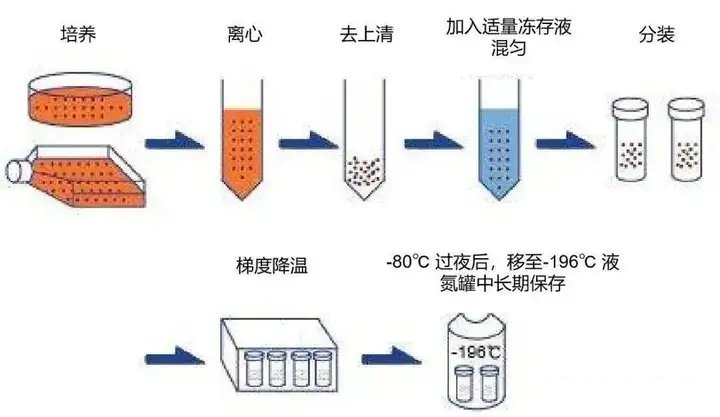Principles and methods of cell cryopreservation (selection of cell cryopreservation solution)
In recent years, the treatment of related diseases through infusion of immune cells or stem cells has achieved good therapeutic effects, and cell therapy technology has shown increasingly broad clinical application prospects. Usually, there is a long interval between cell collection and clinical application, while fresh cell products have a shorter preservation time. In order to extend the cell preservation time or preserve cell products for a long time, cells need to be frozen and stored.
The principle of cell cryopreservation
Cell cryopreservation is a technique that uses a cryoprotective mechanism to place cells in a low-temperature environment, reduce cell metabolism, maintain cell activity, and facilitate long-term storage. After cell recovery, the protein remains active and the structure and function of the cell remain intact.
As the temperature decreases, water inside and outside the cell will crystallize, and the formed ice crystals will cause damage to the cell membrane and organelles, especially during the 0-20 ℃ stage, where the ice crystals are needle shaped and easily cause cell damage. When cells are directly frozen without any protective agents, ice crystals formed in the internal and external environment of the cells can cause mechanical damage, electrolyte elevation, osmotic pressure changes, dehydration, pH changes, protein denaturation, etc. inside the cells, leading to cell death.
If cryoprotectants are added to cell solutions, they can protect cells from solute damage and ice crystal damage. Cryoprotectants are prone to binding with water molecules, lowering the freezing point. Under slow freezing conditions, they can allow water inside cells to seep out before freezing to form ice crystals. By reducing the concentration of electrolytes in the unfrozen solution, cells are protected from solute damage and can be preserved under ultra-low temperature (liquid nitrogen) conditions. The cryoprotective effect of cryoprotectants on cells is also related to freezing rate, freezing temperature, and rewarming rate, and different cryoprotectants have different cryoprotective effects.

Cell cryoprotectants
Cell cryoprotectants can be divided into two types based on whether they penetrate the cell membrane: permeable and non permeable. Permeable cryoprotectants can penetrate into cells through the cell membrane and are mostly small molecules, including dimethyl sulfoxide (DMSO), glycerol, ethylene glycol, propylene glycol, methanol, ethanol, etc. These protectants can penetrate the cell membrane and penetrate into the cell before the complete coagulation of the cell suspension, reducing the formation of ice crystals inside the cell and thus reducing cell damage. DMSO is an important component in clinical grade cryoprotectants, and currently classic cryoprotectants typically contain around 10% DMSO. DMSO is the most commonly used cryoprotectant and medicinal excipient, and its detailed information can be found in the Medicinal Excipient Database of the Drug Evaluation Center of the National Medical Products Administration. Non permeable cryoprotectants are generally large molecular substances that cannot penetrate into cells, mainly including dextrose glycosides, sucrose, polyethylene glycol, glucan, albumin, etc. They can preferentially combine with water molecules in the solution to lower the freezing point and reduce the formation of ice crystals. Due to its high molecular weight, it can reduce the concentration of electrolytes in the solution, thereby reducing solute damage. At the same time, it can also reduce the concentration of low molecular solutes (electrolytes) in the solution and alleviate salt damage.
The general process of cell cryopreservation
The process of cell cryopreservation should be slow, while recovery should be the opposite, and rapid heating should be used. The reason for slow freezing, as mentioned above, is to avoid the formation of ice crystals that can cause damage to cells before the water inside the cells can detach from them during cooling. (1) Observe the cell status before freezing, measure cell viability and count. (2) Collect the cells to be frozen in a centrifuge tube, centrifuge at 1200-1800 rpm for 5 minutes, and discard the supernatant. (3) Adjust the cell cryopreservation density as needed, slowly add an appropriate volume of pre cooled cryopreservation solution or commercially available serum-free cell cryopreservation solution, and resuspend the cells. (4) Divide the cell suspension into cryopreservation tubes, tighten the tube cap, and mark it properly. (5) Put the cryopreservation tube into a program cooling box (pre cooled), then place it in a -80 ℃ freezer overnight, and transfer it to a liquid nitrogen tank for long-term storage the next day.
How to choose cell cryopreservation solution
The quality and composition of cell cryopreservation solution have a significant impact on the cryopreservation effect of cells. If the composition of the cell cryopreservation solution is inappropriate or the quality is not up to standard, it may lead to cell cryopreservation failure or low survival rate after cell recovery.
When choosing a cell cryopreservation solution, the following three important factors should be considered:
(1) Cell types have different requirements for the composition and concentration of cell cryopreservation solutions.
(2) The longer the cell is frozen, the higher the requirement for the cell cryopreservation solution.
(3) The quality and composition of cell cryopreservation solution have a significant impact on the recovery rate of cells.
Let me introduce to you belowLi Ji Biology~The main products of Li Ji's biological cell cryopreservation solution are:
Drug grade cell cryopreservation solution (non programmed cooling)
Rapid cell cryopreservation solution (GMP grade)
Serum-free cell cryopreservation solution (without DMSO)
Serum-free cell cryopreservation solution (enhanced)
Rapid cell cryopreservation solution (serum-free, protein-free)
1、 Rapid cell cryopreservation solution (serum-free, protein-free)
Product Description
Heyuan Liji Rapid Cell Cryopreservation Solution (serum-free, protein-free) is suitable for the vast majority of tumor cells and conventional cells, and most stem cells (Heyuan Liji has tested cell types, please follow the official website). Frozen cells can be stored for a long time at -80 ℃ (>6 years). Free from animal derived proteins and serum components, it can effectively reduce contamination by various bacteria, viruses, and mycoplasma, ensuring the safety of frozen cells. This cryopreservation solution contains various cellular nutrients such as DMSO and glucose, which improve cell survival and vitality. It is also suitable for serum-free culture of cells and protein expressing cells.
Product advantages
1. Without the need for programmed cooling, cells can be directly placed in cryopreservation solution and stored in a -80 ℃ refrigerator (-80 ℃ can be stored for more than 6 years), and the cryopreservation solution does not need to be diluted.
2. The cryopreservation solution does not contain serum, greatly reducing the possibility of cell contamination.
3. Do not add serum, do not repeatedly cool down step by step, and do not use liquid nitrogen. Overall, it saves time and money.
The case list can be found on the official website - Resource Support! For the cryopreservation data of each cell, please refer to the Li Ji cryopreservation solution database below (data feedback from the user)
Product components
Product Name | Article number | Specifications |
Rapid cell cryopreservation solution (serum-free, protein-free) | AC05L032 | 30mL |
Rapid cell cryopreservation solution (serum-free, protein-free) | AC05L033 | 100mL |
Transportation and Preservation
Transport at room temperature. Store at 4 ℃ and have a shelf life of 24 months.
2、 Serum-free cell cryopreservation solution (without DMSO)
Product Description
Li Ji Biological serum-free cell cryopreservation solution (DMSO free) is suitable for the cryopreservation of various cells, especially for the cryopreservation of primary liver cells, nerve cells, etc.
ordering information
Product Name | Article number | Specifications |
Serum-free cell cryopreservation solution (without DMSO) | AC05L164 | 100mL |
Product parameters
PH value: | 25±2℃时,7.2-7.8 |
Bacteria: | negative |
fungus: | negative |
mycoplasma: | negative |
Transportation and Preservation
Blue ice transportation. Sealed and stored at 4 ℃, with a validity period of 12 months.
3、 Serum-free cell cryopreservation solution (enhanced)
Product Description
Li Ji Biological serum-free cell cryopreservation solution (enhanced) is suitable for the cryopreservation of commonly used animal cell lines, especially for the cryopreservation of primary cells, stem cells, etc.
ordering information
Product Name | Article number | Specifications |
Serum-free cell cryopreservation solution (enhanced) | AC05L053 | 100mL |
Product parameters
appearance: | Light yellow clear solution |
PH value: | 25±2℃Time,7.2-7.8 |
Bacteria: | negative |
fungus: | negative |
mycoplasma: | negative |
endotoxin: | <1 EU/mL |
Transportation and Preservation
Blue ice transportation. Sealed and stored at 4 ℃, with a validity period of 24 months.
4、 Rapid cell cryopreservation solution (GMP grade)
Product Description
Heyuan Liji Rapid Cell Cryopreservation Solution (GMP grade) does not contain animal derived proteins or serum components, which can effectively reduce contamination by various bacteria, viruses, and mycoplasma, ensuring the safety of frozen cells. Universal to various animal cell lines, especially suitable for cryopreservation of protein expressing cells such as primary cells, stem cells, and hybridomas.
This product contains a variety of protective and stabilizing agent combinations, which can significantly reduce the freezing point of the solution during the freezing process, improve the permeability of the cell membrane to water, and effectively prevent damage to cells by ice crystals; Simultaneously reducing the concentration of electrolytes around cells during freezing to avoid electrolyte damage; It can also delay the mutual squeezing of cells during the freezing process, protecting the cell membrane. This greatly improves the cell recovery rate and vitality.
Product advantages
Convenient:Ready to use, without the need for programmed cooling, cells can be directly stored in a freezer at -80 ℃, or transferred to liquid nitrogen for long-term storage.
Efficient:The cell survival rate and recovery vitality are high, generally exceeding 90%.。
Safety:No serum, no animal derived ingredients, clear chemical composition, greatly reducing the possibility of cell contamination.
High quality:Strict quality control, product performance comparable to imported; All raw materials are selected from rigorously tested low endotoxin, high-purity medicinal grade raw materials, using a low DMSO formula, and the injection water configuration fully complies with GMP production.
Small inter batch differences:The entire production and packaging process is carried out in the GMP clean workshop, and strict quality testing for endotoxins, osmotic pressure, pH, bacterial pathogens, etc. is carried out to ensure product quality and consistency between batches.
Widely applicable:Suitable for various animal cell lines, especially for the cryopreservation of protein expressing cells such as primary cells, stem cells, and hybridomas; It has been proven through experiments that it does not affect the phenotype and growth status of stem cells, and can maintain the pluripotency of stem cells.
Product components
Product Name | Article number | Specifications |
Rapid cell cryopreservation solution (GMP grade) | AC05L043 | 100mL |
Transportation and Preservation
Blue ice transportation. Store at 4 ℃, valid for 12 months.
5、 Drug grade cell cryopreservation solution (non programmed cooling)
Product Description
Drug assisted cell cryopreservation solution (non programmed cooling) is a ready to use cell cryopreservation solution independently developed by Li Ji Biotechnology, which contains 7.5% DMSO, serum free, and animal free ingredients. It provides a safe and effective protective environment for cells in ultra-low temperatures (-80 ℃ to -196 ℃), and the cell viability can reach over 90% after cryopreservation and recovery.
This product contains aqueous solutions of glycine, DMSO, and phosphate buffer, suitable for cryopreservation of mesenchymal stem cells.
ordering information
Product Name | Article number | Specifications |
Drug grade cell cryopreservation solution (non programmed cooling) | AC05L174 | 100mL |
Product parameters
appearance: | Clear and transparent solution |
Load capacity: | Should not be lower than the indicated capacity |
PH value: | 7.0~7.6(25±2℃) |
osmotic pressure: | 1650~2025 mOsmol/Kg |
sterile: | Should grow aseptically |
mycoplasma: | Should comply with regulations |
endotoxin: | <0.25EU/mL |
Transportation and Preservation
Blue ice transportation. Sealed and stored at 4 ℃, with a validity period of 24 months.
This product is limited to scientific experimental research and cannot be used in clinical diagnosis, treatment, or other fields.














 Back
Back
 Back
Back



























